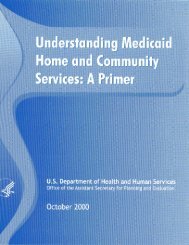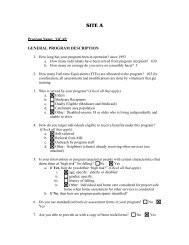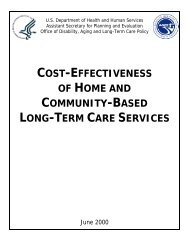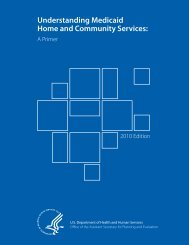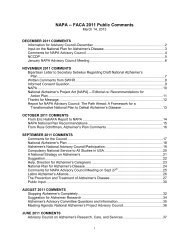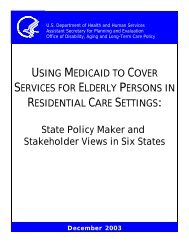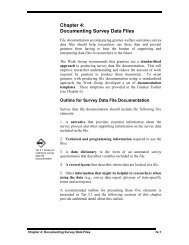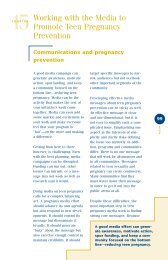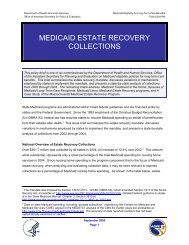physical activity fundamental to preventing disease - ASPE - U.S. ...
physical activity fundamental to preventing disease - ASPE - U.S. ...
physical activity fundamental to preventing disease - ASPE - U.S. ...
Create successful ePaper yourself
Turn your PDF publications into a flip-book with our unique Google optimized e-Paper software.
Regular <strong>physical</strong> <strong>activity</strong> can help improve the lives of young people beyond its effects on<br />
<strong>physical</strong> health. Although research has not been conducted <strong>to</strong> conclusively demonstrate a direct<br />
link between <strong>physical</strong> <strong>activity</strong> and improved academic performance, such a link might be<br />
expected. Studies have found participation in <strong>physical</strong> <strong>activity</strong> increases adolescents= self-esteem<br />
and reduces anxiety and stress. 22 Through its effects on mental health, <strong>physical</strong> <strong>activity</strong> may help<br />
increase students= capacity for learning. One study found that spending more time in <strong>physical</strong><br />
education did not have harmful effects on the standardized academic achievement test scores of<br />
elementary school students; in fact, there was some evidence that participation in a two-year<br />
health-related <strong>physical</strong> education program had several significant favorable effects on academic<br />
achievement. 24<br />
Participation in <strong>physical</strong> <strong>activity</strong> and sports can promote social well-being, as well as good<br />
<strong>physical</strong> and mental health, among young people. Research has shown that students who<br />
participate in interscholastic sports are less likely <strong>to</strong> be regular and heavy smokers or use drugs 25 ,<br />
and are more likely <strong>to</strong> stay in school and have good conduct and high academic achievement. 26<br />
Sports and <strong>physical</strong> <strong>activity</strong> programs can introduce young people <strong>to</strong> skills such as teamwork, selfdiscipline,<br />
sportsmanship, leadership, and socialization. Lack of recreational <strong>activity</strong>, on the other<br />
hand, may contribute <strong>to</strong> making young people more vulnerable <strong>to</strong> gangs, drugs, or violence.<br />
Physical Activity and Good Mental Health<br />
Regular <strong>physical</strong> <strong>activity</strong> reduces morbidity and mortality from mental health disorders. 27 Mental<br />
health disorders pose a significant public health burden in the United States and they are a major<br />
cause of hospitalization and disability. Mental health disorders cost approximately $148 billion<br />
per year. 22 Potentially, increasing <strong>physical</strong> <strong>activity</strong> levels in Americans could substantially reduce<br />
medical expenditures for mental health conditions.<br />
In adults with affective disorders, <strong>physical</strong> <strong>activity</strong> has a beneficial effect on symp<strong>to</strong>ms of<br />
depression and anxiety. 27 Animal research suggests that exercise may stimulate the growth of new<br />
brain cells that enhance memory and learning⎯two functions hampered by depression. Clinical<br />
studies have demonstrated the feasibility and efficacy of exercise as a treatment for depression in<br />
older men and women. Currently, National Institute of Mental Health (NIMH) investiga<strong>to</strong>rs are<br />
conducting research comparing the effectiveness of home-based and supervised aerobic exercise<br />
<strong>to</strong> the use of antidepressants in relieving depression in these groups, and reducing relapse rates.<br />
Other NIMH researchers are studying whether greater exercise levels result in more symp<strong>to</strong>m<br />
improvement. Regular <strong>physical</strong> <strong>activity</strong> also appears <strong>to</strong> enhance well-being.<br />
The preventive effects of <strong>physical</strong> <strong>activity</strong> on mental disorders are less well studied. Some studies<br />
suggest <strong>physical</strong> <strong>activity</strong> prevents depressive illness. Future research will clarify the extent <strong>to</strong><br />
9



